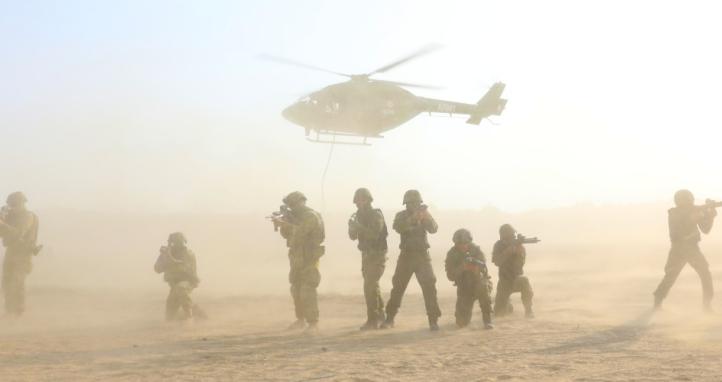Facts and figures
| Government type | Federal Parliamentary Constitutional Monarchy |
| Notable people |
|
The ‘Know Your Region’ series is designed to support unit and individual professional military education on the South East Asian region. It’s important for all serving members of our military to have a foundational knowledge of the countries and issues in the Indo-Pacific.
MALAYSIA – DIPLOMACY
On this page:
- Overview
- Government and Politics
- Foreign Policy and Diplomacy
- International Forums
Overview
Malaysia’s location has long made it an important cultural, economic, social, and trade link between the islands of Southeast Asia and the mainland. Through the Strait of Malacca – which separates the Malay Peninsula from the archipelago – flowed maritime trade and with it influences from China, India, the Middle East, and the east coast of Africa. Prior to the 14th century, several powerful maritime empires existed in what is modern-day Malaysia. Arguably the most significant of which were the Srivijayan which controlled much of the southern part of the peninsula between the 7th and 13th centuries, and the Majapahit Empire which took control over most of the peninsula and the Malay Archipelago between the 13th and 14th centuries. The adoption of Islam between the latter period also saw the rise of powerful maritime states and sultanates on the Malay Peninsula and the island of Borneo. This included the port city of Malacca (Melaka) which was an important commercial centre, and at its height in the 15th century had its own navy and hosted thousands of Chinese, Arab, Persian and Indian merchants. To learn about Malaysia’s long history, check out the video below.
Before the onset of European colonisation, the Malay Peninsula was known locally as Tanah Melayu meaning Malay Land. The Portuguese in the 16th century and the Dutch in the 17th century were the first European colonial powers to establish themselves on the Malay Peninsula and Southeast Asia; however, it was the British who ultimately secured their hegemony across the Malay Kingdoms. During the late 18th and 19th centuries, they established colonies and protectorates in the area that is now Malaysia and linked the development of the peninsula and Borneo. While under the rule of the British Empire, the immigration of hundreds of thousands of ethnic Chinese and Indians as mine and plantation workers took place from the early 1800s until the 1930s.
The Japanese Empire occupied these colonial holdings during World War II from 1942 to 1945. The occupation commenced with the Imperial Japanese Army landings at Padang Pak Amat beach Kota Bahru just after midnight on 8 December 1941, triggering a ferocious battle with the British Indian Army. The battle marked the official start of the Pacific War and the beginning of the Japanese occupation of Malaya. As 31 January 1942 approached, the whole of Malaya had fallen into Japanese hands. Ethnic tensions were heightened and nationalism grew during this period as the Imperial Japanese Army took a hard-line view of the Chinese population while the Malays and Indians were dealt with more moderately. However, atrocities took place all over the territory, including massacres, mutual guarantee units (hostages), mass executions, and forceful abductions of Malay and Chinese women to serve as comfort women.
Popular support for independence increased after Allied forces reconquered Malaya. In 1948, the British-ruled territories on the Malay Peninsula – except Singapore – formed the Federation of Malaya, which eventually became an independent member of the Commonwealth of Nations on 31 August 1957. The state was re-formed in 1963 when the past British colonies of Singapore, North Borneo, Sabah and Sarawak joined the Federation. Now called Malaysia, it means 'Land of the Malays'. For a quick overview of the formation of Malaysia, watch the next video.
The first years of the country's independence were marred by a communist insurgency, Indonesian confrontation with Malaysia, Philippine claims to Sabah, and Singapore's expulsion in 1965. This was all amid an undercurrent of ethnic tensions that lingered from British colonial rule. The country suffered from a sharp division of wealth between the Malaysian Chinese who dominated most urban areas and were perceived to be in control over large portions of the economy, and the Malays who were generally poorer and more rural. Ethnic strife culminated in the 13 May race riots in 1969.
During the 22-year term of Prime Minister Mahathir Mohamad (1981-2003), Malaysia was successful in diversifying its economy from dependence on exports of raw materials to the development of manufacturing, services, and tourism. Mahathir and a newly formed coalition of opposition parties defeated Prime Minister Mohamed Najib bin Abdul Razak's United Malays National Organization (UMNO) in May 2018, ending over 60 years of uninterrupted rule by UMNO. Mahathir resigned in February 2020 amid a political dispute. King Abdullah then selected Tan Sri Muhyidden Yassin as the new Prime Minister. To learn more about Malaysia’s break from British colonisation to gain independence, see the video by TRT World and access the following resources.
- Videos
- Podcasts
- History of Southeast Asia | Episode 23, British Singapore, Malaya, and Borneo
- History of Southeast Asia | Episode 37: Japan Strikes, The Fall of Malaya and Singapore
- History of Southeast Asia | Episode 105: Malaysia, Another Success Story
- Analysand | EP - 043 Malaysia - A history of race & capital [EN]
- Articles
Government and Politics
Malaysia is a federal constitutional elective monarchy; the only federal country in Southeast Asia. The system of government is closely modelled on the Westminster parliamentary system, a legacy of British rule. Kuala Lumpur is the national capital, largest city, and the seat of the legislative branch of the federal Government. The nearby planned capital of Putrajaya is the administrative centre and so hosts the seat of both the executive branch (cabinet, federal ministries, and agencies) along with the federal judicial branch. Malaysia's Constitution has been amended many times – the latest in 2019 – since coming into effect on 27 August 1957, although several sections are excluded from amendment or repeal.
The chief of state is an elected monarch, chosen from among the nine state sultans every five years. The King, whose office title is Yang di-Pertuan Agong, is currently King Sultan Abdullah Sultan Ahmad Shah. The position of the King is primarily ceremonial, but they are the final arbiter on the appointment of the head of government – the Prime Minister. Recently taken by Prime Minister Ismail Sabri Yaakob on 21 August 2021 after his predecessor former Prime Minister Tan Sri Muhyiddin Yassin resigned a few days earlier.
The bicameral Parliament of Malaysia (Parlimen Malaysia) consists of the Senate (Dewan Negara) and House of Representatives (Dewan Rakyat). In July 2019, a bill to lower the voting age to 18 years old was officially passed, the previous age of registered voters was 21 and above. The next general elections are expected in July 2023 at the latest.
Although the judiciary is theoretically autonomous, its independence has been called into question with the view that the appointment of judges lacks accountability and transparency. Malaysia also has a special court to hear cases brought by or against royalty. The death penalty is in use for serious crimes such as murder, terrorism, drug trafficking, and kidnapping. Separate from and running parallel to the civil courts are the Syariah Courts that apply Sharia law to Muslims in the areas of family law and religious observances. Watch the next video for an explainer of Malaysia’s system of governance.
Malaysia consists of 13 states (negeri-negeri, singular - negeri) and three federal territories (Wilayah Persekutuan). These are divided between two regions, with 11 states and two federal territories on Peninsula Malaysia, and the other two states and one federal territory in East Malaysia. Each state is broken down into districts, which are separated into mukim. In Sabah and Sarawak, the districts are grouped into divisions. The 13 states are based on historical Malay kingdoms and nine of the 11 Peninsular states retain their royal families. Each state has its own written constitution. With Sabah and Sarawak retaining more autonomy than the other states, most notably having separate immigration policies and controls, and a unique residency status.
Federal intervention in state affairs, lack of development, and disputes over oil royalties have occasionally led to statements about secession from leaders in several states such as Penang, Johor, Kelantan, Sabah, and Sarawak. Although these have not been followed up with action, and no serious independence movements exist. The indigenous peoples of Malaysia have also voiced concern over access to their land rights across the archipelago. Check out the next video to learn more.
Recent politics are defined by the 1Malaysia Development Berhad (1MDB) scandal, which is a major global corruption scandal involving an insolvent strategic development company owned by the Minister of Finance and implicating then Prime Minister Najib Razak in 2015. A lawsuit filed by the United States Department of Justice (DOJ) alleged at least US$4.5 billion had been stolen from Malaysia's 1MDB state-owned fund and channelled into personal bank accounts. On 28 July 2020, former Prime Minister Najib Razak was found guilty on seven charges and sentenced to 12 years in prison. The 1MDB scandal contributed to the first change in ruling political party in the 2018 general election since Malaysia's independence. In the early 2020s, the country was gripped by further political challenges compounded by health and economic crises caused by the COVID-19 pandemic. To learn more about the financial fraud case watch the video below.
Race continues to be a significant force in politics. Affirmative action measures, such as the New Economic Policy followed by the National Development Policy, were implemented to advance the standing of the bumiputera. The bumiputera consists of ethnic Malays and indigenous tribes, whereas non-bumiputera refers to Malaysian Chinese and Malaysian Indians. These policies provide preferential treatment to bumiputera in employment, education, scholarships, business, as well as access to cheaper housing and assisted savings. However, it has generated greater interethnic resentment within Malaysian society. Additionally, there is ongoing debate over whether the laws and society of Malaysia should reflect secular or Islamic principles. Other significant problems in Malaysia that receive less attention are human trafficking and sex trafficking. Access the following list of resources for more details on Malaysia’s Government and politics.
- Videos
- CNA Insider | What’s Really Behind Malaysia’s State Of Emergency?
- Goody Feed TV | Malaysia Politics Explained That Even a 5-YO Will Understand
- CNA Insider | Inside The Power Struggle Within Muhyiddin’s ‘Backdoor Government’
- TEDx Talks | A Lost Generation - Youth in Politics - Syed Saddiq - TEDxMonashUniversityMalaysia
- TRT World | Malaysia's monarchy explained
- Articles
- Reuters | Forced labour main human trafficking crime in Malaysia, U.S. says
- BBC News | Anger as Covid-ravaged Malaysia lifts pandemic measures
- ABC News (U.S.) | Malaysian king says Parliament must resume despite emergency
- The ASEAN Post | Young Malaysians Find Their Voice Amid A Pandemic
- BBC News | Najib Razak: Malaysian ex-PM gets 12-year jail term in 1MDB corruption trial
- TRP | Actually, What Are The Agong's Powers?
Foreign Policy and Diplomacy
Under the stabilising leadership of Prime Minister Tunku Abdul Rahman (up to 1970), Malaysia pursued a stridently pro-Commonwealth anti-communist foreign policy. Nonetheless, Malaysia was active in the opposition movement to apartheid that saw South Africa quit the Commonwealth in 1961, was a founding member of the Association of Southeast Asian Nations (ASEAN) in 1967, and the Organisation of the Islamic Conference (OIC) in 1969 with Tunku serving as its first Secretary-General in 1971.
Under Prime Ministers Tun Abdul Razak and Tun Hussein Onn, Malaysia shifted its foreign policy towards non-alignment and neutrality. Kuala Lumpur’s official stance continues to be based on the principles of neutrality and maintaining peaceful relations with all countries, regardless of their ideology or political system. The Government attaches a high priority to the security and stability of Southeast Asia and seeks to further develop relations with countries in the region.
This policy shift was strengthened by Prime Minister Mahathir bin Mohamad, who pursued a regionalist and prominent Global South policy with at times intense anti-Western rhetoric. He long sought to establish an East Asian Economic Group as an alternative to APEC – excluding Australia, New Zealand, and the Americas – and during his premiership Malaysia signed up to an ASEAN Free Trade Area (AFTA) and ASEAN+3, a regional forum with China, Japan, and South Korea. A strong tenet of Malaysia's policy is national sovereignty and the right of a country to control its domestic affairs.
Despite Mahathir’s frequently anti-Western rhetoric he worked closely with Western countries and led a crackdown against Islamic fundamentalists after the 11 September 2001 attacks on the Twin Towers in the United States. Under his successor, Abdullah Badawi, relations with Western countries – particularly Australia – have improved. The current Minister of Foreign Affairs is Dato’ Seri Hishamuddin Hussein, who assumed office on 10 March 2020. To hear from current Prime Minister Ismail Sabri Yaakob at the latest United Nations General Debate, watch the video below.
The origin of the Ministry of Foreign Affairs (MOFA), commonly referred to as Wisma Putra, began before Malaysia’s independence in 1957. The Ministry bears the mandate and responsibility to conduct Malaysia’s foreign relations with other countries. This includes matters related to political relations, economic affairs, security matters, along with social and cultural promotion. Geared towards fulfilling its role and functions including upholding Malaysia’s sovereignty, territorial integrity and national interests; monitoring regional and global developing; developing foreign policy options; and providing consular services. MOFA hosts the Institute of Diplomacy and Foreign Relations and Southeast Asia Regional Centre for Counter-Terrorism (SEARCCT).
Releasing the Foreign Policy Framework of the New Malaysia in June 2019. The central theme is ‘Change in Continuity’ and sets out how Malaysia will continue implementing the normative principles of international relations that have guided its diplomatic practice over the years, alongside new reformative changes in approach and spotlighting certain issues. A new emphasis on governance, human rights, justice, and fairness in the domestic realm will be mirrored by Kuala Lumpur in its international conduct. The Government aspires to be more active and vocal in championing issues of interest. For example; global justice and fairness, economic diplomacy, and sharing of ideas such as Maqasid Syari’ah (higher objectives of the Syari’ah) and the concept of Muslim Democrats – to name a few. It consists of four broad Framework components: direction of foreign policy, empowering MOFA, enhancing inter-agency collaboration, and increasing civil society participation.
The Framework identifies three categories of national interests in New Malaysia: security, economy and identity. In terms of security, this Framework highlights the changes in issues pertaining to territorial dispute and the South China Sea, migration and irregular movement of people, cyber security and terrorism. In the economic dimension it discusses issues related to Industrial Revolution 4.0, digital economy, ASEAN, and fairer systems of international trade and finance. In the context of identity this Framework elaborates on the changes to human rights issues, assistance in post-conflict and post-disaster situations, memberships in international organisations, the Muslim world, South-South Cooperation, relations with major powers, and international treaties and agreements. For more information on Kuala Lumpur’s broader ‘New Malaysia’ scheme, watch the CNA Insider below.
In recent times, Kuala Lumpur has been an active proponent of regional cooperation, perceiving these relations to be the cornerstone of its foreign policy. The current administration plans to adopt a more proactive approach in its foreign policy. This means influencing decisions even in processes that the country is not officially a party, as well as shaping opinions on emerging global issues.
The policy towards lingering territorial disputes by the Malaysian Government is one of pragmatism and solving disputes, including some resolved in the International Court of Justice. The Spratly Islands are disputed by many states in the area, with a substantial portion of the South China Sea claimed by the People’s Republic of China. Unlike its neighbours of Vietnam and the Philippines, Malaysia historically avoided conflicts with China. However, after the encroachment of Chinese ships in Malaysian territorial waters, Kuala Lumpur has become active in condemning Beijing. In 2009, Brunei and Malaysia announced an end to claims of each other's territory and committed to resolve issues related to their maritime borders. The Philippines has a dormant claim to the eastern part of Sabah, known as the North Borneo Dispute. Additionally, Singapore’s land reclamation has caused tensions between the close neighbours. To learn more about the relations between Malaysia and Singapore, see the next video.
Access the following resources for more information on Malaysia’s diplomacy.
- Videos
- R.AGE | The Malaysian Drug Trade: Investigating Malaysia's drug mule syndicates
- Bloggingheads.tv | An overview of Malaysia’s foreign policy | Natalie Sambhi & Elina Noor
- Asia Europe Institute, University of Malaya | Malaysia’s National Role Conceptions and Transitions of Foreign Policy from Tunku to Mahathir
- The Business Year | UK-Malaysia bilateral relations explored
- Arirang News | N. Korea cuts diplomatic ties with Malaysia over extradition of citizen to U.S.
- Podcasts
- Articles
- ISIS Malaysia | South China Sea: Malaysia to stick with ‘quiet diplomacy’ towards Beijing in dispute, analysts say
- Australian Institute of International Affairs | Evolving Policy: Malaysian Diplomacy in the South China Sea - Australian Institute of International Affairs
- IN Diplomacy | H.E. Dato' Dr Azfar Bin Mohamad Mustafar: Ready to Deepen Already Deep-Rooted Ties
- Modern Diplomacy | Malaysia in the geopolitical picture of Southeast Asia
- The ASEAN Post | Will Sabahans Choose Malaysia Or Philippines?
- World Politics Review | Malaysia and Singapore Use a Leaders’ Summit to Ease Tensions
International Forums
Generally, multilateralism is the grand policy that Malaysia has followed since independence. A founding member of the ASEAN and the OIC, the country participates in many international organisations such as the United Nations (UN), the Asia-Pacific Economic Cooperation (APEC), the Developing 8 Countries, G-15 and G-77 economic groups, Asian Development Bank, and South Centre. Kuala Lumpur was the site of the first East Asian Summit in 2005. As a former British colony, it is also a member of the Commonwealth of Nations.
ASEAN is the cornerstone of Kuala Lumpur's foreign policy goals and strategies. Malaysia is one of the few ASEAN members that have pushed for initiatives to enhance intraregional economic cooperation. In the past, Kuala Lumpur demonstrated determination to achieve some consensus on the South China Sea issue between ASEAN countries and China but could not secure a joint declaration. Still, Malaysia continues to try to make its mark, and to find out more about Malaysia’s role in ASEAN, check out the next video.
The modern relations between the United Kingdom and Malaysia are conditioned by British colonial rule from the 19th century until its independence. Since the foundation of the Malaysian Federation, several visits have been made between royal and state leaders. The most recent on 2 November 2017, Prince Charles and his wife Camilla, the Duchess of Cornwall, made an official visit to Malaysia to commemorate the 60th anniversary of bilateral relations between the two countries. In 2017, Malaysia was the United Kingdom’s second-largest trading partner in ASEAN and the United Kingdom was Malaysia’s fourth largest trading country in the European Union (EU). The withdrawal of the UK from the EU has propelled negotiations for an increase in trade and investment between London and Kuala Lumpur. To learn more about the second biggest inter-country organisation, the Commonwealth of Nations, watch the following video.
Malaysia is closely affiliated with the UN and many of its specialised agencies, including the World Bank, International Monetary Fund (IMF), and International Atomic Energy Agency. On 31 October 2011 Malaysia became a party to the Antarctic Treaty 1959. For an overview of the UN’s work in Malaysia, watch the brief video below.
Check out the list of resources for more information about Malaysia’s influence on international forums.
- Videos
- Articles
- AP News | Malaysia warns Myanmar to cooperate with envoy or no summit
- Malay Mail | PM Ismail Sabri: Malaysia fully supports Asean chair’s decision on Myanmar’s representation
- Malay Mail | Malaysia welcomes appointment of Noeleen Heyzer as UN sec-gen’s special envoy on Myanmar, says foreign minister
- The ASEAN Post | ICERD non-ratification tarnishes Malaysia’s image
Discussion Questions:
- Malaysia’s foreign policy typically revolves around addressing and promoting regional issues, which it pushes through regional forums such as ASEAN. What is Malaysia’s main foreign policy agenda and how does Australian interests align or conflict with this policy?
- How has Malaysia’s history influenced its current relationships with regional and global nations? What is the status of Australia’s relationship with Malaysia, and how can we look to improve on it in support of regional interests?
Know your region
Know Your Region series gives you a shortcut to understanding other nations in the Indo-Pacific region.









